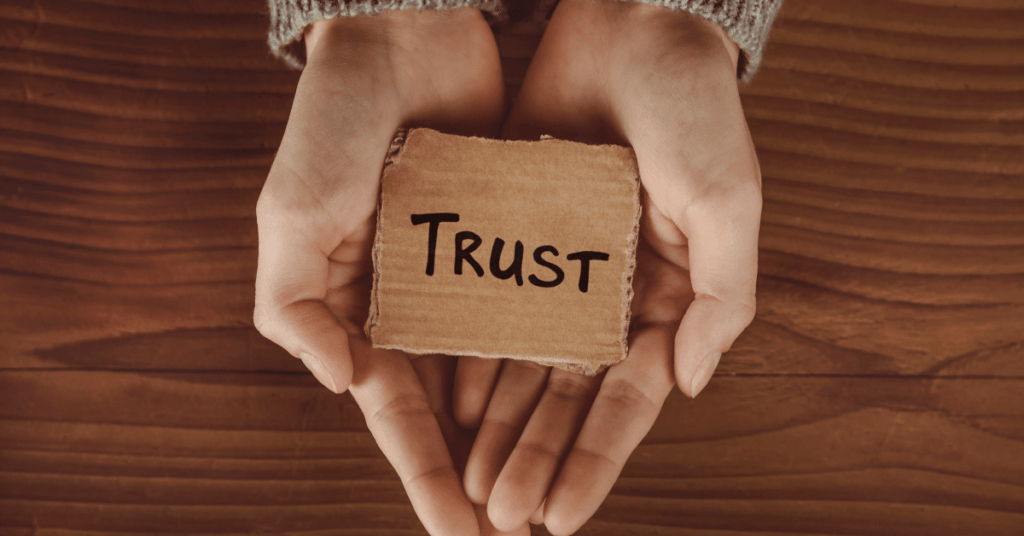The psychology of trust is the study of how and why we trust other people. It includes examining the factors that influence our decision to trust someone, as well as the consequences of trusting them. It’s a complex area of research that has a lot of implications for our everyday lives.
Contents
What Is Trust Psychology?
 The psychology of trust is a huge area of cognitive psychology and involves many different areas within the field. There are quite a few definitions, which vary depending on what aspect of trust is being discussed. But one definition that most people agree on is that “trust” means expecting honesty from somebody, or assuming they have good intentions.
The psychology of trust is a huge area of cognitive psychology and involves many different areas within the field. There are quite a few definitions, which vary depending on what aspect of trust is being discussed. But one definition that most people agree on is that “trust” means expecting honesty from somebody, or assuming they have good intentions.
In regards to the mechanics of how it works in our brain. There are a few different explanations as to how it happens. One popular belief is that we’re born with a natural capacity for trusting others. Another idea is that we make judgments about other people’s character and then use those judgments to guide our behavior. That might lead us towards trusting them more or less depending on whether we make a favorable judgment.
Overall, the psychology of trust is a fascinating area that covers many different aspects of our behavior and cognition. It’s something that we all experience in our everyday lives and it’s interesting to explore the various factors that go into it.
Factors That Makes Us Trust Someone
There are a ton of factors that can influence whether or not someone trusts someone else, but here are just a few more: having power over another person, being in a positive mood, being socially comfortable, and feeling like someone is competent.
Dominance
Well, one thing that has been shown to affect trust is how dominant someone is. In one study, participants were asked to rate how dominant they were and then to choose whether or not they would trust a partner in a game. It was found that those who were more dominant were less likely to trust their partners. This might be because they’re more likely to put their own interests first and are less likely to trust anyone else.
Similarity
Another factor that has been shown to affect trust is how similar someone is to us. In one study, participants were asked to rate how similar they felt to their partners. It was found that those who felt more similar to their partners were more likely to trust them. This might be because those who are more similar to us share some of the same traits as we do, and therefore it’s reasonable for us to trust them because they’re a part of our group.
Attractiveness
One last factor that affects trust is how attractive someone is, according to a recent study. In this particular study, participants were told they were going to play a game with another person. Sometimes they were told that the other player was attractive and sometimes they weren’t. It was found that those who were told that their partner was attractive were less likely to trust them, even if there wasn’t any reason not to. This might be because being attractive usually means that someone has a lot of extra resources compared to us, and we might think that they don’t need to be concerned about us or our interests.
Benefits Of Trust
 The benefits of trusting someone are many-fold.
The benefits of trusting someone are many-fold.
When we trust someone, we’re more likely to cooperate with them and to believe what they say. We also tend to feel better around them, as trust is a key ingredient in close relationships. And finally, when we trust someone, it often leads to them trusting us in return, which can result in a mutually beneficial relationship.
Consequences Of Trust
Well, there are a few different consequences that can come from trusting someone. One is that we might be more likely to cooperate with them and to help them out. Another is that we might be more likely to share personal information with them. And finally, we might be more likely to believe what they say.
If we trust the wrong person, it can have serious consequences for us. It might lead to us being exploited in some way or to our resources being drained by them. And it could even lead to us getting in trouble with the law when they do something illegal behind our backs.
The costs of not trusting someone are also many-fold. Not trusting someone can lead to problems in group dynamics, as people tend to act more selfishly when they don’t trust their peers. It can also lead to the person who isn’t trusted doing things behind our backs, which often results in us getting hurt or exploited by them or someone else. And not trusting someone can make us more likely to be anxious and irritable, which is bad for our personal lives and relationships.
Different Types Of Trust
The psychology of trust is about how we perceive and judge the reliability of others. It includes examining the different types of relationships in which we place our trust and the consequences of trusting someone. Trust is a complicated issue, and it affects us in many different areas of life.
Interpersonal Trust
 One of the most important types of trust is interpersonal trust, which is the type we have with the people we know. At first, we might not really trust someone and be very careful around them, and over time we’ll learn to trust them more. We also have intergroup trust, which is the type of trust that exists between people in different groups. This kind of trust can be tricky because it’s not always easy for members of different groups to cooperate with one another or to share beliefs. Finally, there are universalistic values, which are goals that are important to all groups. These goals include things like justice and equality, and they’re thought to affect how trustworthy someone is.
One of the most important types of trust is interpersonal trust, which is the type we have with the people we know. At first, we might not really trust someone and be very careful around them, and over time we’ll learn to trust them more. We also have intergroup trust, which is the type of trust that exists between people in different groups. This kind of trust can be tricky because it’s not always easy for members of different groups to cooperate with one another or to share beliefs. Finally, there are universalistic values, which are goals that are important to all groups. These goals include things like justice and equality, and they’re thought to affect how trustworthy someone is.
Institutional Trust
Another type of trust is institutional trust. This is the type of trust we have in institutions such as businesses, the government, or the legal system. We usually develop this type of trust gradually over time: at first, we might not really trust an institution and be very careful around it, and over time we’ll learn to trust it more. It’s important to have institutional trust because it allows us to cooperate and function as a society.
Finally, there’s trust in the natural world, which is the type of trust we have in things that aren’t human. We usually develop this type of trust gradually over time: at first, we might not really trust something and be very careful around it, and over time we’ll learn to trust it more. It’s important to have trust in the natural world because it allows us to live in harmony with our environment.
Evolution Of Trust Psychology
Trust is a complex issue that has evolved over time. It involves making decisions about whether or not someone else is reliable, and it’s influenced by many different factors. One type of trust is between romantic partners, another type is in business transactions, and the last type isn’t based on any specific relationship.
In regards to how it may have evolved, a recent book suggests that the phenomenon of trust has been evolutionarily advantaged because those who relied on it were more likely to achieve their goals and therefore had an advantage over other individuals in the group. This idea is supported by past research which shows that dominant behavior can influence whether or not someone trusts someone else.
Trust In Relationships

When it comes to our relationships, we place a great deal of trust in the people we’re close to. We share personal information with them, we cooperate with them, and we believe what they say. This is because we feel like we can trust them to do the right thing and to have our best interests at heart.
Trust In Business Transactions
Businesses also need to be able to trust one another in order to conduct transactions. This means that they need to be able to rely on each other to follow through on their commitments and to behave ethically. When businesses don’t trust one another, it can lead to a lot of problems.
How To Increase Your Trust Level With Others And Yourself?
Increasing our level of trust with other people isn’t always easy, but it can be done in a few different ways. When it comes to trusting someone, it’s important to be aware of the different types of trust that exist. There’s trust between romantic partners, trust between people in different groups, and trust in the natural world. We usually develop these types of trust gradually over time: at first, we might not really trust someone and be very careful around them. And over time we’ll learn to trust them more.
There are a few different ways to increase our level of trust with others.

- One is to spend more time around them and to recognize when they behave in a trustworthy way.
- Another is to put ourselves in their shoes and see if we feel like they might have our best interests at heart.
- Finally, it can help to look for cues that indicate they trust us, like if they express appreciation towards us or treat us in a friendly way.
When you want to increase your level of trust in yourself. It’s important to pay attention to how you feel and let your emotions guide you. If you find yourself constantly anxious about whether or not someone can be trusted despite knowing for sure that they can. Then it might be a sign that you don’t trust yourself very much. In this case, it can be helpful to work on building self-confidence and accepting yourself for who you are.
Conclusion
Trust is a powerful thing. It can help us in our day-to-day lives, but it’s also an essential part of society and business transactions. When we trust someone else to do the right thing. They’re more likely to behave ethically or cooperate with us when we need them to. This article has given you some insight into how different types of trusts work. And what factors influence them-from close relationships to institutions like businesses or governments. Now that you’ve learned about the evolution of trust psychology, use your newfound knowledge for good. Start thinking about ways that these principles might apply to your own life. So you can make better decisions about who to put your faith in next time around.
If you are looking for affordable Online Counseling MantraCare can help: Book a trial therapy session


